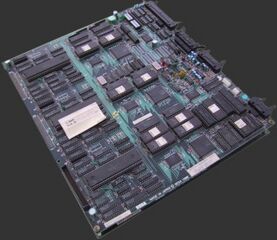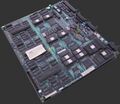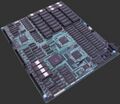Difference between revisions of "Sega Y Board"
From Sega Retro
| Line 9: | Line 9: | ||
}} | }} | ||
}} | }} | ||
| − | The '''Sega Y Board''' is an arcade system board released by [[Sega]] in 1988 as a successor to the [[Sega X Board]]. Like the X Board before it, the Y Board was known for its sprite manipulation capabilities. | + | The '''Sega Y Board''' is an arcade system board released by [[Sega]] in 1988 as a successor to the [[Sega X Board]]. Like the X Board before it, the Y Board was known for its sprite manipulation capabilities. It is the fourth in the Super Scaler series of arcade boards, after the [[Sega Hang-On hardware]], [[Sega OutRun hardware]] and X Board. |
The Y Board is quite different to the X Board in terms of design, offering a third CPU and more advanced video equipment. Most notably, the Y Board allows for real-time rotation of sprites as well as scaling. Unusually, the system uses no tile layers, so graphics are rendered using only sprites (a design taken by [[SNK]] for their Neo-Geo hardware in 1990). | The Y Board is quite different to the X Board in terms of design, offering a third CPU and more advanced video equipment. Most notably, the Y Board allows for real-time rotation of sprites as well as scaling. Unusually, the system uses no tile layers, so graphics are rendered using only sprites (a design taken by [[SNK]] for their Neo-Geo hardware in 1990). | ||
Revision as of 01:59, 22 April 2015

| |||||
| Sega Y Board | |||||
|---|---|---|---|---|---|
| Manufacturer: Sega | |||||
|
The Sega Y Board is an arcade system board released by Sega in 1988 as a successor to the Sega X Board. Like the X Board before it, the Y Board was known for its sprite manipulation capabilities. It is the fourth in the Super Scaler series of arcade boards, after the Sega Hang-On hardware, Sega OutRun hardware and X Board.
The Y Board is quite different to the X Board in terms of design, offering a third CPU and more advanced video equipment. Most notably, the Y Board allows for real-time rotation of sprites as well as scaling. Unusually, the system uses no tile layers, so graphics are rendered using only sprites (a design taken by SNK for their Neo-Geo hardware in 1990).
Technical Specifications
- CPUs: 3 x MC68000 @ 12.5 MHz
- The first 68000 ("main" in MAME) has access to the sound hardware, I/O hardware, and 64KB RAM
- The second 68000 ("subx" in MAME) has access to the ysprites hardware, backup RAM and 16KB RAM
- The third 68000 ("suby" in MAME) has access to the bsprites hardware, ysprites full plane rotation, bsprites palette RAM, and 64KB RAM
- The three CPUs share 64KB of separate RAM for communication as well as the multiplier/divider hardware
- Sound CPU: Z80 @ 4 MHz with 2KB RAM
- Sound chip: YM2151 4 MHz & SegaPCM @ 15.625 MHz
- Display resolution: 320 x 224
- Board composition: CPU board and video board
- Video hardware:
- Two sprite planes with fixed Z-order
- Lower sprite plane ("ysprites" in MAME): full scaling and rotation; also the entire plane can be rotated as a whole
- Palettes are stored alongside the sprite table; sprite table entries hold a pointer to the palette, which itself is stored as an table of palette indirection values(?)
- Higher sprite plane ("bsprites" in MAME): standard Sega System 16B sprite plane
List of Games
- Galaxy Force (1988)
- Galaxy Force II (1988)
- Power Drift (1988)
- G-LOC Air Battle (1990)
- Rail Chase (1991)
- Strike Fighter (1991)
Gallery
| Sega arcade boards |
|---|
| Originating in arcades |
|
77
78
79
80
81
82
83
84
85
86
87
88
89
90
91
92
93
94
95
96
97
98
99
|
| Console-based hardware |
|
84
85
86
87
88
89
90
91
92
93
94
95
96
97
98
99
00
01
02
03
04
05
06
07
08
09
10
11
12
13
14
|
| PC-based hardware |
|
05
06
07
08
09
10
11
12
13
14
15
16
17
18
19
20
21
22
23
|

